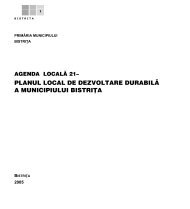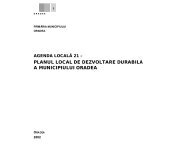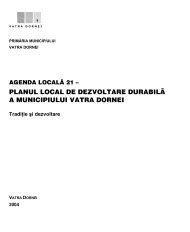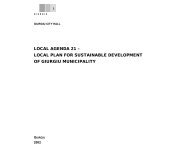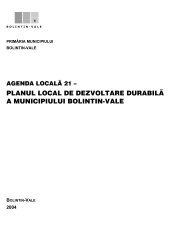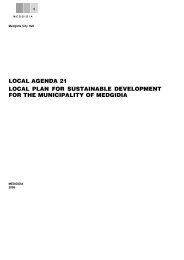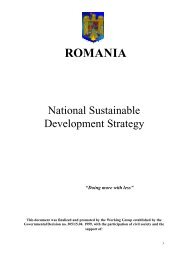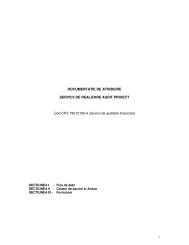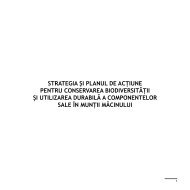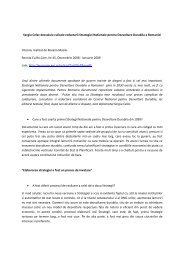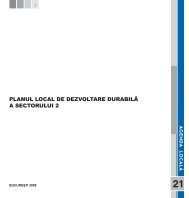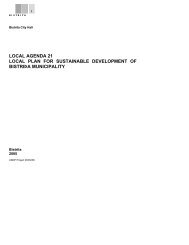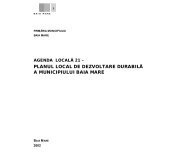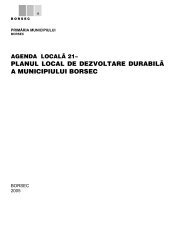Local Plan for Sustainable Development of Sibiu Municipality
Local Plan for Sustainable Development of Sibiu Municipality
Local Plan for Sustainable Development of Sibiu Municipality
Create successful ePaper yourself
Turn your PDF publications into a flip-book with our unique Google optimized e-Paper software.
38<br />
MUNICIPALITY<br />
STRONG POINTS<br />
• Human resources in <strong>Sibiu</strong> capable <strong>of</strong> applying re<strong>for</strong>m to <strong>Sibiu</strong> education, and change it <strong>for</strong> the better.<br />
• Impressive school units, with great traditions and well equipped, with exquisite education results (“Gheorghe<br />
Lazăr” College, “Octavian Goga” High school, “Brukenthal” High school).<br />
• <strong>Development</strong> <strong>of</strong> the “<strong>Sibiu</strong> 2000”European programme.<br />
• School partnerships with European schools in programmes such as “Socrates”, “Comenius” etc.<br />
• Teaching in German, a continuation <strong>of</strong> 15th century traditions, representing a cultural bridge to the prosperity<br />
<strong>of</strong> Germany.<br />
• Successful functioning <strong>of</strong> educational models in a multicultural, multiethnic and multicultural community, with<br />
traditional education stretching back over 400 years.<br />
• Openness <strong>of</strong> the public administration towards education.<br />
• Documentary and in<strong>for</strong>mation centres (the House <strong>of</strong> the Teaching Staff, C. D. I. <strong>for</strong> German education and the<br />
<strong>Sibiu</strong> University libraries).<br />
• Training centres that facilitate the workplace integration <strong>of</strong> young graduates (the Romanian-German<br />
Foundation, the County Centre <strong>for</strong> Labour Force Reconversion).<br />
• Well trained personnel in I. Ş. J., the team having a great number <strong>of</strong> national and regional trainers.<br />
• Increase in number <strong>of</strong> the managers’ initiatives and proposals <strong>for</strong> projects which would lead to co-operations<br />
and <strong>for</strong>eign financing.<br />
During the previous school year, there were managerial boards and teaching staff committees which did not apply the<br />
school re<strong>for</strong>m, and this caused problems:<br />
WEAK POINTS<br />
Regarding the school unit management:<br />
• The managerial activity centred on the administrative field, detrimental to the quality <strong>of</strong> teaching (insufficient<br />
number <strong>of</strong> assistants in classes, obsolete instruments <strong>for</strong> evaluating the teaching process, perfunctorily<br />
monitoring <strong>of</strong> teaching obligations).<br />
• Limits to solving <strong>of</strong> school problems through the elaboration and application <strong>of</strong> projects and partnerships.<br />
• Many <strong>of</strong> the curricular projects from the school development plan were not carried out (<strong>for</strong> example: projects<br />
<strong>for</strong> prevention <strong>of</strong> school failure, <strong>for</strong> training the teaching staff to use the IT equipment, educational<br />
programmes <strong>for</strong> adults etc.).<br />
• Management <strong>of</strong> anthropogenic resources is poor in providing effective structures <strong>for</strong> continuous training <strong>of</strong> the<br />
teaching staff that would support, encourage and motivate the pr<strong>of</strong>essional per<strong>for</strong>mance (including by<br />
attributing <strong>of</strong> annual ratings and merit wages).<br />
• Concern <strong>for</strong> ensuring extra-budgetary material resources is low in the majority <strong>of</strong> the school units.<br />
• Disobedience <strong>of</strong> lawful procedures in applying the sanctions stipulated in the Teaching Staff Statute or<br />
granting <strong>of</strong> merit wages, the ignorant or partial application <strong>of</strong> School Units Functioning Regulations.<br />
• The lack in transparency <strong>of</strong> the managerial act induces mistrust in the teaching staff regarding the resolutions<br />
<strong>of</strong> school units management.<br />
Regarding the application <strong>of</strong> curriculum and reaching curricular standards:<br />
• The absence, in many schools, <strong>of</strong> alternative instruction programmes <strong>for</strong> improvement/recovery leads to<br />
school results below standards and eventually to school failure.<br />
• The absence <strong>of</strong> personalised intervention programmes <strong>for</strong> pupils with special educational needs leads to<br />
inadequacy <strong>of</strong> the instructional <strong>of</strong>fer <strong>for</strong> these pupils.<br />
• The absence <strong>of</strong> didactic support materials leads to the presentation <strong>of</strong> lessons <strong>of</strong> a stereotypical character,<br />
and to the passive presence <strong>of</strong> pupils in classes and lack <strong>of</strong> efficiency in teaching.<br />
• Many optional classes in C.D.Ş. are projected without consulting economic and socio-cultural partners, the<br />
parents and the pupils, giving the impression that only the staff appointment interests were taken into account.<br />
Regarding the relationships with strategic partners:<br />
• The co-operation with economic units is frequently assumed to be superficial, without adapting the instruction



